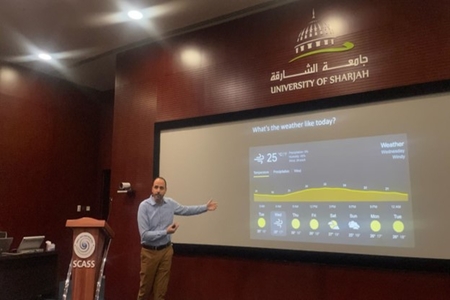The symposium aims to improve the usage of space resources in the Asia-Pacific region and foster a common understanding of space communications among the Member States.

The University of Sharjah (UoS), in collaboration with the Arab Union for Astronomy and Space Science (AUASS) and the Asia-Pacific Space Cooperation Organisation (APSCO), conducted an international symposium on developments in space communications, titled ‘The Regional Balance and Challenges’. The event was organised under the patronage of HH Sheikh Sultan bin Ahmed Al Qasimi, Deputy Ruler of Sharjah and President of UoS.
The two-day event, supported by the Sharjah Academy for Astronomy, Space Science, and Technology (SAASST) and the Inter-Islamic Network on Space Science and Technology (ISNET), aimed to improve the usage of space resources in the Asia-Pacific region and foster a common understanding of space communications among the Member States. The symposium featured a series of scientific sessions discussing over 25 research papers and included eight training workshops led by a group of experts, researchers, and specialists in astronomy and space sciences.
The symposium covered various topics, including the applications of artificial intelligence in space communication, space law, Arab space cooperation, and the security risks and vulnerabilities of nano-satellite communication systems. Additionally, the symposium addressed the expansion of international cooperation to develop space communications, the role of AUASS in promoting education and scientific research in space and astronomy, trends in the global satellite communications market and technology, as well as the competitive aspects of space communication and their impact on future telecommunications regulations.
Prof. Hamid M.K. Al Naimiy, Chancellor of the University of Sharjah and Director-General of SAASST, emphasised that this symposium serves as a source of inspiration and opens new avenues for collaboration in the fields of space sciences, communications, and technology, with participation from more than 15 countries, including representatives from the National Space Science Authority in the Kingdom of Bahrain, the Emirates Space Agency, and the UAE Telecommunications and Digital Government Regulatory Authority.
He also noted that the University of Sharjah is committed to educating the new generation in the fields of astronomy and space sciences by offering a range of academic programs, such as the Master of Science in Astronomy and Space Sciences, the Master in Air and Space Law, and, in the near future, a PhD programme in Space Science and Technology.
Xu Yansong, Director-General of APSCO, added: “In our increasingly interconnected world, effective space communication systems are essential for fostering international collaboration, enhancing scientific research, and bridging the digital divide. This symposium aims to provide a platform for the exchange of knowledge, expertise, collaboration, and innovation. By highlighting successful regional initiatives that can serve as models for others, engaging in discussions, sharing insights, and exploring potential collaborations, we can forge partnerships that promote the greater good of humanity.”
The forum began with a two-day preliminary short training course on ‘Frequency and Orbital Elements in Satellite Design (ITU Regulations and International Standards)’, which focused on enhancing practical skills and knowledge on various topics related to space communications. Dr. Awni Al-Khasawneh, Secretary-General of AUASS further explained that AUASS is committed to training Arab professionals by organising such events and conferences aimed at advancing astronomy and space sciences in the Arab region.
During the symposium, participants had the opportunity to watch a special show at the Sharjah Planetarium, which addressed the contribution of technology to improving space communication and the role of satellites in this field. They also enjoyed stargazing and interactive telescope activities, allowing them to explore the stars and planets, further enriching their experience. These activities are part of SAASST’s efforts to promote scientific culture. The symposium was concluded with the honouring of participants in the scientific sessions.
